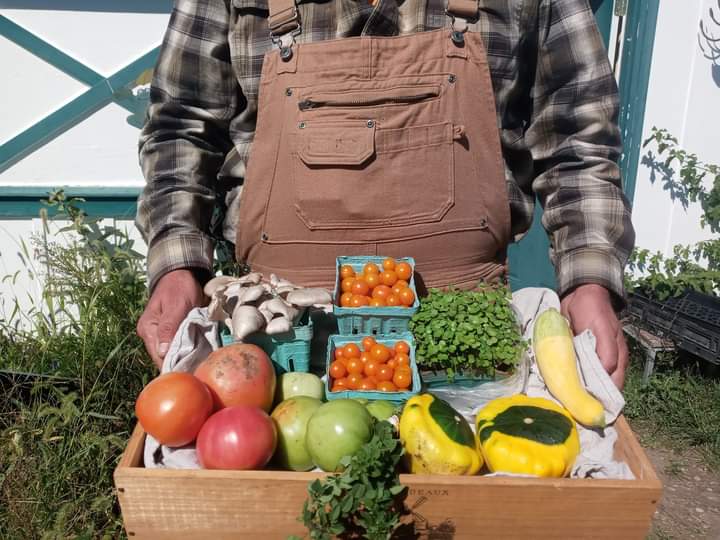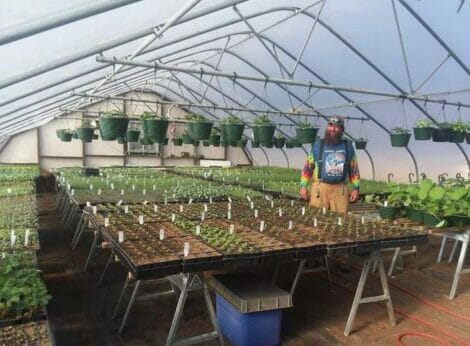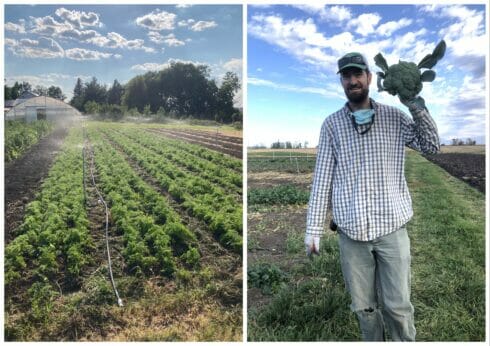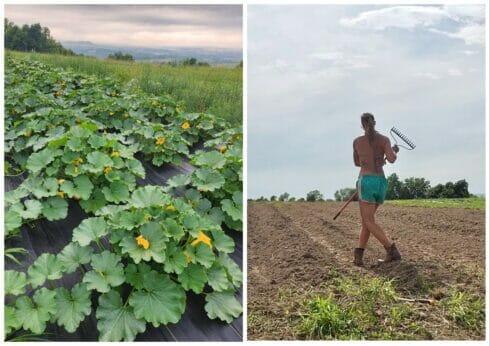Farmers are driven by a desire to be productive. But as running a small farm feels increasingly precarious, many are being driven into the ground.

I noticed it when first learning farming 14 years ago, traveling around small diverse vegetable farms in the US and Ecuador. Small farms that made all their household income from the farm struggled the most, despite selling something we all need—food.
This especially applied if farmers weren’t wealthy beforehand, weren’t running their business like a hobby or didn’t have substantial side income. Nevertheless, these farms were honorably scraped together from nothing, their growers much like passionate artists in the field; their art: beautiful, healthy local food. But although they worked as hard and long as the founders of successful companies, making the same personal sacrifices, these farmers couldn’t seem to even earn a decent living off farm income alone. Still, they were driven—by something, if not for money.
My biggest takeaway from those years? “When I start my own farm, I will need to have off-farm income to live a balanced, happy life.” When I started Jupiter Ridge Farm in 2017, I did—and still do, like many traditional family farms. But why is it like this? Why is running a small-scale farm more like an expensive hobby? And what does this mean for the future of our food?
Ben Saunders started Wabi Sabi Farm near Des Moines, Iowa in 2013, drawing enough customers to live off diverse vegetable farm income for about 10 years. He said some communities can support local food farmers this way; that’s not the case with Iowa now.
“Single person, no student loans… I could live on very little,” says Saunders. Of his farm’s name, he says, “Wabi Sabi is a belief system recognizing the imperfect beauty in nature… the natural cycles of growth and decay.” Although principally operating as a CSA (Community Supported Agriculture), Saunders also worked with food pantries. “I didn’t care about having straight rows… I wanted to produce food for people.”
In early 2023, however, he closed his doors forever. Unpredictable weather and the changing local food scene plagued him. CSA memberships dropped as door-to-door meal prep companies boomed. Farmers markets became less about farmers and more like craft shows packed with food trucks. His personal life suffered; long hours meant little time for family, friends, relationships. “I had to get out,” he says.

“I wanted to produce food for people,” says Ben Saunders of his time running Wabi Sabi Farm. (Photo courtesy of Ben Saunders)
He didn’t fully walk away from farming, in a sense. He now works full-time for a commercial greenhouse, still driven to grow—just for somebody else. Would his farm still be in operation if the business were more sustainable? “I had a feeling it could have been, yes.”
Increasingly, small farm businesses are becoming less profitable, data suggests, and must be run more like hobby farms. Some small farms are even classified as hobby farms by default (10 acres or less in some areas), may lose agricultural tax or property benefits and not be legally considered a farm, despite producing food for their local communities. Per the 2021 Ag Census, data also showed that, from 2011 to 2021, small farmers were increasingly likely to operate as high-risk businesses.
Although long a reality of farming life, more and more small farms are turning into businesses that need side income to survive. Even midsize and large family farms operators tend to have a more lucrative off-farm job or a spouse with side income. While many family farms may say this is just part of the lifestyle, it represents the diminishing value we assign to farm labor and the difficult math of small-scale farming.
Nevertheless, full-time farm life is attractive and paints an idyllic picture. The rewards are great: a connection with nature, eating healthy, an appealing countryside lifestyle. But lurking in the background can be endless worry, stress and financial strife when the farm is the farmer’s sole income stream. Some farmers I’ve spoken to amass debt they couldn’t pay back to stay open. Major repairs were unaffordable. There was no personal time— each step off farm could trigger massive anxiety. Summer vacation? Impossible. Personal lives and relationships? In jeopardy, or nonexistent.
What’s clear though is that some farmers, even when not making ends meet, can’t stop. Growing food for your local community can be an itch that needs scratching. I can attest to this, and so can Jordan Scheibel, who started his small diverse vegetable business Middle Way Farm in central Iowa back in 2013. He, too, announced he was closing in 2023— but not forever.
“Despite the burnout, despite the lack of profitability… it’s quite personal,” he says of taking a year’s hiatus to reopen in 2024. Lack of family time and financial struggles were present, but these weren’t at the heart of the problem.

Jordan Scheibel experienced burnout while operating his diverse vegetable farm. (Photos courtesy of Jordan Scheibel)
In 2020, Middle Way Farm scaled up rapidly to meet the pandemic local food boom. His passion for growing tapped this urgency to meet demand— but threatened his farming endurance capacity altogether, and thus the business’s long-term future. “I was well aware, on some level, of all of these problems the whole time,” he adds. “I was working too much, and I didn’t think it was ever going to improve… Really, for me, until I decided to step back, [the impulse to farm] was what was pushing me.”
A 2017 Guardian article described an ‘agrarian imperative theory’ whereby farmers have a strong urge to supply essentials for human life, such as food, and to hold on to their land at all costs. “When farmers can’t fulfill this instinctual purpose, they feel despair,” the article reads. “Thus, within the theory lies an important paradox: The drive that makes a farmer successful is the same that exacerbates failure”— economic failure. And it’s not the fault of the farmer. Our food economy is built on farm life amnesia: The lifestyle is romanticized, but the real labor (and those willing to do it) is hidden from view. The farming lifestyle is admired, marketed, monetized—while local food farmers, especially small-scale operators, and agricultural labor are pushed deeper into the shadows.
Small and family farm numbers are dropping, and even the most dedicated growers are run ragged by the economic reality. From 2012 to 2017, the US lost almost 54,000 small family farms. All this is ironic: Urbanites may be longing for “farm life” since the pandemic, but consumers largely don’t go out of their way to support farmers directly—whether due to the high prices some small farmers must set, issues of convenience or other factors—and thus support this lifestyle they admire. Buying direct from full-time small local farmers helps whenever possible, whether at farmers markets or through CSA memberships. If you run a food-related business or institution such as a restaurant, grocer or university kitchen, sourcing directly from farmers can be especially impactful.

(Photos courtesy of Adrian White)
Scheibel also mentions pressure from similar yet bigger, more profit-focused farms, to scale up. Only, these farms closed before his. “They were profitable,” says Scheibel. “But they were never satisfied…They felt they were putting in the amount of work where they deserved to earn a lot more than that. Because most people who put in that amount of work would be CEOs.”
Wealthy, business-minded people are getting drawn to agriculture–Bill Gates, Thomas Peterrfy, Dan Barber, to name a few; an interest to become the farmer, rather than support the farmer, is on the rise. This could be good, although the prospect of small, local food farming getting “gentrified” into hobby farms (by the people who can afford it) looms in my head. But I do know that farming demands something beyond business acumen to be successful.
Long-term, sustainable, small-scale farm businesses don’t survive if there isn’t passion there, that drive and “farmer’s impulse” no money could make up for. “Being able to paint on a landscape… and every year you get to re-make that… it’s extremely satisfying,” says Scheibel. “But, yeah… that’s an impulse. That’s separate from running the business.” And that’s not to say wealthy would-be farmers can’t hear the farm call, get the itch.
Maybe we’re evolved to be farmers; maybe it’s in our DNA. But if you feel called to enter the local food marketplace, be prepared to collaborate— not compete—with farmers from all backgrounds to improve the local food market and survivability rates of others like you. Because we are an endangered species. And we can’t afford to shove each other out of what tiny natural habitat we have left.
“[Farming] has to exist,” says Scheibel. “Because it’s needed. It’s absolutely necessary. But to actually do it on a scale… where you feel connected and integrated into what you’re doing… is not ‘profitable.’ And that’s where we’re at.”
What if the farm bill subsidized small farmers as much as soy and corn? What if America provided Healthcare and a universal income to citizens. We could pay for that if we cut spending on the industrial war complex and taxed the ultra wealthy.
This article is not accurate and frustrating to read. I farm in North Carolina on a 1/3 of an acre and know plenty of farmers producing food on an acre or less that are making a good living without off-farm income. They cover their costs, pay themselves a living wage and produce tons of food for their communities. Yes we are losing farm land. Because the development value of the land is way higher than a new farmer looking for property to farm can afford. And just like any small business, farmers have to learn to grow smarter, not harder.… Read more »
There is no reason why small-scale farming can’t be profitable. But the reality is that typical profit margins in agriculture – at any scale – are 10-15% of gross sales at best. So you’re not going to support your family on a farm that grosses $100,000 without off-farm income. It’s not that small farming isn’t feasible, but you need to have realistic expectations.
This is a lovely article that definitely helps for those of us who feel this way. During 2020 and 2021, CSAs went up to help the displaced cost of lack of markets. But now the markets are busy and there is a lack of CSAs. We have to grow each year in a completely different way to support a different thing. And now we sell to CSAs farmers markets, other produce box programs, small market vendors and restaurants. There just isn’t an industry that has to do what farmers have to do to be a small business. There isn’t grants… Read more »